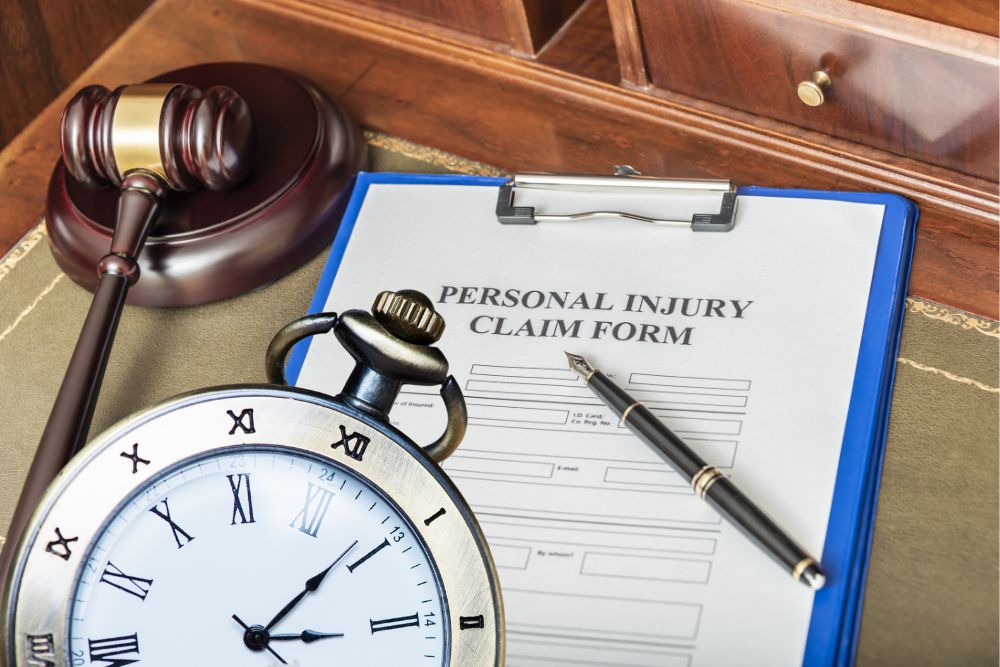After a personal injury accident, it's natural to have a lot of questions. One of the most common questions victims have is how long they have to claim injury after an accident.
Timing is crucial when it comes to personal injury claims, as your claim faces strict deadlines. In this blog, we will explore the timeline for filing a personal injury claim and why it is essential to act promptly.
If you or a loved one suffered an injury in an accident, consult a personal injury lawyer as soon as possible. An experienced attorney can guide you and fight for your rights while you focus on your physical recovery.
Schedule a Free Initial Consultation Today!
Factors that Determine the Time Limit for Filing a Personal Injury Claim

When it comes to filing a personal injury claim, several factors can influence the time limit within which you can make your claim. These factors include the statute of limitations, the type of accident, and the severity of the injuries sustained.
The statute of limitations is a legal timeframe within which a lawsuit must be filed. It varies from state to state and can range from one to six years. You need a lawyer who knows the statute of limitations in your state, as failure to file within this timeframe can result in the court barring your claim.
The type of accident you were involved in can also impact the time limit for filing a personal injury claim. Different accidents may have different statutes of limitations, so consult an injury lawyer to determine the specific timeframe for your case. For example, the time limit for filing a claim in a car accident case may differ from that in a slip and fall case.
The severity of your injuries is another factor that can affect the time limit for filing a personal injury claim. Some injuries may take time to manifest fully, and you may not immediately know that you need to pursue a claim. However, even if you don’t know the full extent of your injuries at the time of the accident, the statute of limitations may keep running.
The Statute of Limitations for Personal Injury Claims
The statute of limitations for personal injury claims sets a specific time limit within which a legal action must be initiated. The exact timeframe varies from state to state, so never wait to consult a lawyer familiar with your jurisdiction's laws.
The statute of limitations for personal injury claims generally ranges from one to six years. Some states have a fixed time limit of, for example, two or three years from the date of the accident, while others have a varying time limit depending on the circumstances.
The statute of limitations clock starts ticking from the date of the accident or the date of injury, depending on the state laws. Once the specified time period has passed, you may lose your right to seek compensation for your injuries.
Exceptions to the Statute of Limitations
While the statute of limitations sets the general time limit for filing a personal injury claim, some common exceptions may extend or alter the timeframe.
One exception is the discovery rule, which applies when the injury or its cause is not immediately apparent. In such cases, the statute of limitations may start running from the date the injury or you discover or should have discovered its cause through reasonable diligence.
Another exception is tolling agreements. These are agreements between the parties involved in a potential legal action to pause or suspend the statute of limitations for a specified period. Tolling agreements are typically used during ongoing settlement negotiations or when the injured party is minor or legally incapacitated.
There is also the statute of repose, which sets an absolute deadline beyond which no legal action can be initiated, regardless of whether the injury or its cause is discovered or not. This deadline is generally longer than the statute of limitations and can range from ten to twenty years from the date of the alleged negligent act.
You should consult with a lawyer to understand if any of these exceptions may apply to your case and potentially extend the time limit for filing a personal injury claim.
Seeking Medical Attention
Seeking immediate medical attention after an accident is important for your health and plays a crucial role in establishing a clear connection between the accident and your injuries. Delaying medical treatment can weaken your personal injury claim as the insurer may argue that the accident did not cause your injuries.
You should visit a healthcare professional as soon as possible after an accident, even if you do not immediately feel pain or notice any injuries. Some injuries, such as whiplash or internal injuries, may not manifest right away but can worsen over time.
Documenting your medical treatment and following all recommended treatments and therapies can provide valuable evidence for your personal injury claim.
Damages in a Personal Injury Claim
When pursuing a personal injury claim after an accident, a lawyer can explain the types of damages you may deserve. Damages refer to the compensation you may seek for the physical, emotional, and financial losses you have suffered as a result of the accident. There are two main types of damages in a personal injury claim: economic and non-economic.
Economic damages are the quantifiable losses with specific financial values. These typically include medical expenses, lost income, property damage, and any other out-of-pocket expenses incurred due to the accident.
Non-economic damages, on the other hand, are intangible losses that are more challenging to assign a precise monetary value to. These can include pain and suffering, emotional distress, loss of enjoyment of life, and loss of consortium.
Why You Should File a Personal Injury Claim Promptly
Filing a personal injury claim promptly is crucial for several reasons. First and foremost, it ensures the preservation of evidence that may be key to supporting your claim. The longer you wait to file a claim, the greater the chance crucial evidence can be lost or compromised.
Additionally, filing promptly allows for gathering witness statements while the events are fresh in people's minds. Witness testimony can establish liability and prove the extent of your injuries.
Furthermore, filing a claim early on opens up the possibility for early settlement negotiations. In some cases, the responsible party's insurance company may offer a fair settlement if your lawyer approaches them early in the process. Waiting too long to file a claim can result in lost opportunities for early resolution and fair compensation.
Common Types of Personal Injury Accidents and Their Time Limits for Filing a Claim
The time limits for filing a personal injury claim can vary depending on the type of accident or incident. Here are the general time limits for some common types of accidents:
Car accidents: The statute of limitations for car accidents typically ranges from one to six years, depending on the state. The time limit may vary depending on whether the accident resulted in injuries or only property damage.
Slip and falls: For slip and fall accidents, the time limit for filing a personal injury claim is usually between one to three years, depending on the state.
Consult a personal injury attorney to determine the specific time limit for your type of accident and jurisdiction.
What if You Miss the Time Limit for Filing a Personal Injury Claim
If you have missed the time limit for filing a personal injury claim, options may still be available to seek compensation. One possible option is to explore the potential for tolling agreements, which can pause or suspend the statute of limitations for a specified period.
Seeking legal advice is crucial in such situations. An attorney can assess the specifics of your case and advise you on the best course of action. They may explore alternatives to filing a personal injury lawsuit, such as negotiating a settlement directly with the responsible party or pursuing alternative dispute resolution methods like mediation or arbitration.
While filing a personal injury claim as soon as possible is generally advisable, speaking with an attorney can help you explore any available options, even if you have missed the typical time limit.
The Benefits of Retaining a Personal Injury Lawyer

Navigating the legal process after a personal injury accident can be overwhelmingly complex, especially if you are dealing with injuries and emotional distress. By retaining a personal injury lawyer to represent your claim, you can focus on your recovery while leaving the legal matters to a professional.
Here are a few benefits of hiring an injury lawyer:
- Legal Experience: Personal injury lawyers know how to handle accident cases and understand the intricacies of the law. They have the knowledge and experience to navigate through the complexities of your case and ensure that your rights are protected.
- Case Evaluation: An experienced lawyer will evaluate the strength of your case, identifying the liable parties and potential sources of compensation. They will guide you through the process, advise you on the possible outcomes, and help you make informed decisions.
- Negotiation Skills: Personal injury lawyers are skilled negotiators who will advocate for your rights and fight for full and fair compensation. They will handle all communication with insurance companies and defense attorneys, ensuring that you do not settle for less than you deserve.
- Litigation Representation: A personal injury lawyer will be prepared to take your case to trial if a fair settlement cannot be reached through negotiations. They will represent you in court, presenting a compelling argument on your behalf and fighting for the compensation you deserve.
Working with a competent attorney increases your chances of securing maximum compensation for your injuries, medical expenses, lost income, and pain and suffering.
The Importance of Seeking Legal Advice for Your Personal Injury Claim
Seeking legal advice is of utmost importance when pursuing a personal injury claim. Personal injury laws can be complex, and a knowledgeable attorney can guide you through the process, ensuring that your rights are protected and your claim is handled properly.
An experienced attorney can evaluate the strength of your case, gather necessary evidence, and navigate the legal complexities to maximize your chances of obtaining fair compensation. They can negotiate with insurance companies on your behalf and, if necessary, take your case to court.
Furthermore, an attorney can help you understand the full extent of your damages and ensure you are adequately compensated. They can assess medical expenses, lost income, pain and suffering, and any potential long-term effects of the injury to build a strong case for maximum compensation.
Navigating the legal process can be overwhelming, but with the guidance of a skilled attorney, you can have peace of mind knowing that your case is in capable hands.
A lawyer can explain the time limits for filing a personal injury claim and ensure that you have the opportunity to seek compensation for your injuries.
Factors such as the statute of limitations, the type of accident, and the severity of injuries can influence the timeframe within which you can make your claim. By seeking timely legal advice and acting promptly, you can protect your rights and increase your chances of obtaining fair compensation.
Consult a law firm near you today. These discussions and evaluations are free, so you have nothing to lose by acting today. Protect yourself and your financial future.




























